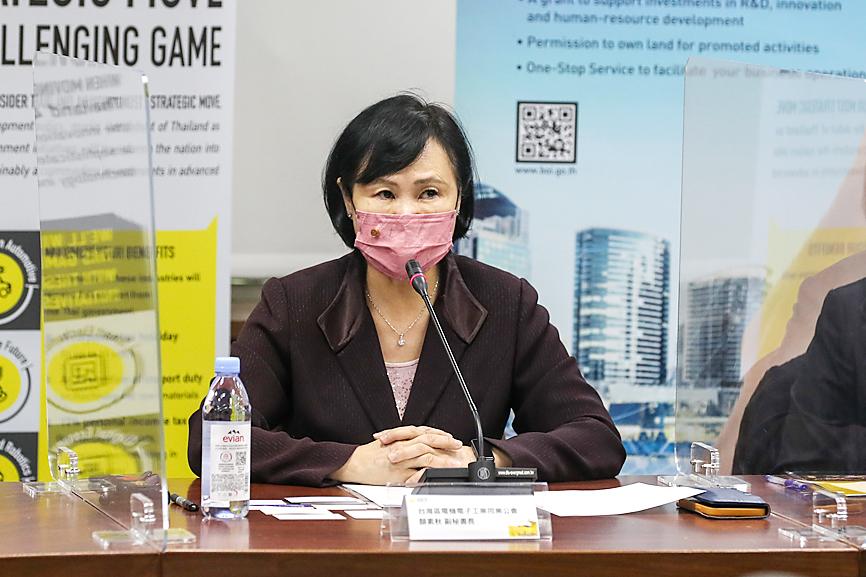Taiwan’s tech sector could face rising costs stemming from the war between Russia and Ukraine, while companies with operations in Eastern Europe are bracing for economic spillover from a war that is being fought “right up to their doorstep,” industry representatives said.
Despite Asia’s geographic distance from the conflict and its relatively low level of financial exposure to Russia and Ukraine, the comprehensive nature of the sanctions imposed on Moscow — including its exclusion from the SWIFT international payment system and a ban on semiconductor exports to Russia — make some spillover inevitable, experts said.
A number of Taiwanese tech firms have facilities in Poland, the Czech Republic and Slovakia, meaning the war is being fought “right up to their doorstep,” Taiwan Electrical and Electronic Manufacturers’ Association (電電公會) deputy secretary-general Yen Su-chiu (顏素秋) said.

Photo: CNA
While Russia accounts for less than 1 percent of Taiwan’s electronics exports, some of these firms might face bad debts and related cash flow problems as a direct or indirect result of the sanctions, she said.
A greater fear is that the economic impact of the conflict would spread across Eastern European markets.
Etay Lee (李宜泰), president of motherboard and graphics card manufacturer Gigabyte Technology Co (技嘉科技), said that while Russian clients accounted for less than 3 percent of the firm’s revenue, he was concerned about the potential for economic spillover in neighboring countries.
For many small to medium-sized Taiwanese firms with investments in the region, the question now is how and when to cut their losses to avoid potential cash flow issues and contractual disputes.
A survey of more than 100 Taiwanese firms with business in Russia and Ukraine, conducted on March 1 and 2, found that trade between the two countries had all but ceased after the outbreak of war on Feb. 24, the Importers and Exporters Association of Taipei (台北市進出口商業公會) said.
The survey found that about 70 percent of respondents were having difficulties collecting debts, while more than 20 percent were concerned about possible contractual disputes due to shipping delays or stoppages, the association said.
A final concern is the key position that Russia and Ukraine hold in the export of specific products, despite forming a combined total of just 2 percent of global trade, said Alicia Garcia-Herrero, chief economist for the Asia-Pacific region at the French investment bank Natixis SA.
In a recent analysis, Garcia-Herrero highlighted Russia’s significant share of the export of products such as neon gas (70 percent), palladium (37 percent) and nickel (9 percent), which are vital to Asia’s semiconductor and electric vehicle battery producers.
“The proportion of these materials is small, but critical in supply chains,” meaning that the costs for these industries would grow if Russia restricts exports, she said.

SEEKING CLARITY: Washington should not adopt measures that create uncertainties for ‘existing semiconductor investments,’ TSMC said referring to its US$165 billion in the US Taiwan Semiconductor Manufacturing Co (TSMC, 台積電) told the US that any future tariffs on Taiwanese semiconductors could reduce demand for chips and derail its pledge to increase its investment in Arizona. “New import restrictions could jeopardize current US leadership in the competitive technology industry and create uncertainties for many committed semiconductor capital projects in the US, including TSMC Arizona’s significant investment plan in Phoenix,” the chipmaker wrote in a letter to the US Department of Commerce. TSMC issued the warning in response to a solicitation for comments by the department on a possible tariff on semiconductor imports by US President Donald Trump’s

The government has launched a three-pronged strategy to attract local and international talent, aiming to position Taiwan as a new global hub following Nvidia Corp’s announcement that it has chosen Taipei as the site of its Taiwan headquarters. Nvidia cofounder and CEO Jensen Huang (黃仁勳) on Monday last week announced during his keynote speech at the Computex trade show in Taipei that the Nvidia Constellation, the company’s planned Taiwan headquarters, would be located in the Beitou-Shilin Technology Park (北投士林科技園區) in Taipei. Huang’s decision to establish a base in Taiwan is “primarily due to Taiwan’s talent pool and its strength in the semiconductor

An earnings report from semiconductor giant and artificial intelligence (AI) bellwether Nvidia Corp takes center stage for Wall Street this week, as stocks hit a speed bump of worries over US federal deficits driving up Treasury yields. US equities pulled back last week after a torrid rally, as investors turned their attention to tax and spending legislation poised to swell the US government’s US$36 trillion in debt. Long-dated US Treasury yields rose amid the fiscal worries, with the 30-year yield topping 5 percent and hitting its highest level since late 2023. Stocks were dealt another blow on Friday when US President Donald

UNCERTAINTY: Investors remain worried that trade negotiations with Washington could go poorly, given Trump’s inconsistency on tariffs in his second term, experts said The consumer confidence index this month fell for a ninth consecutive month to its lowest level in 13 months, as global trade uncertainties and tariff risks cloud Taiwan’s economic outlook, a survey released yesterday by National Central University found. The biggest decline came from the timing for stock investments, which plunged 11.82 points to 26.82, underscoring bleak investor confidence, it said. “Although the TAIEX reclaimed the 21,000-point mark after the US and China agreed to bury the hatchet for 90 days, investors remain worried that the situation would turn sour later,” said Dachrahn Wu (吳大任), director of the university’s Research Center for